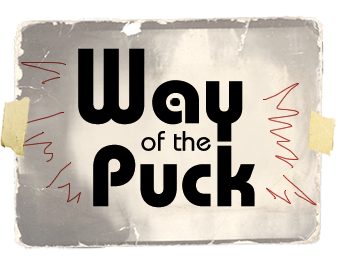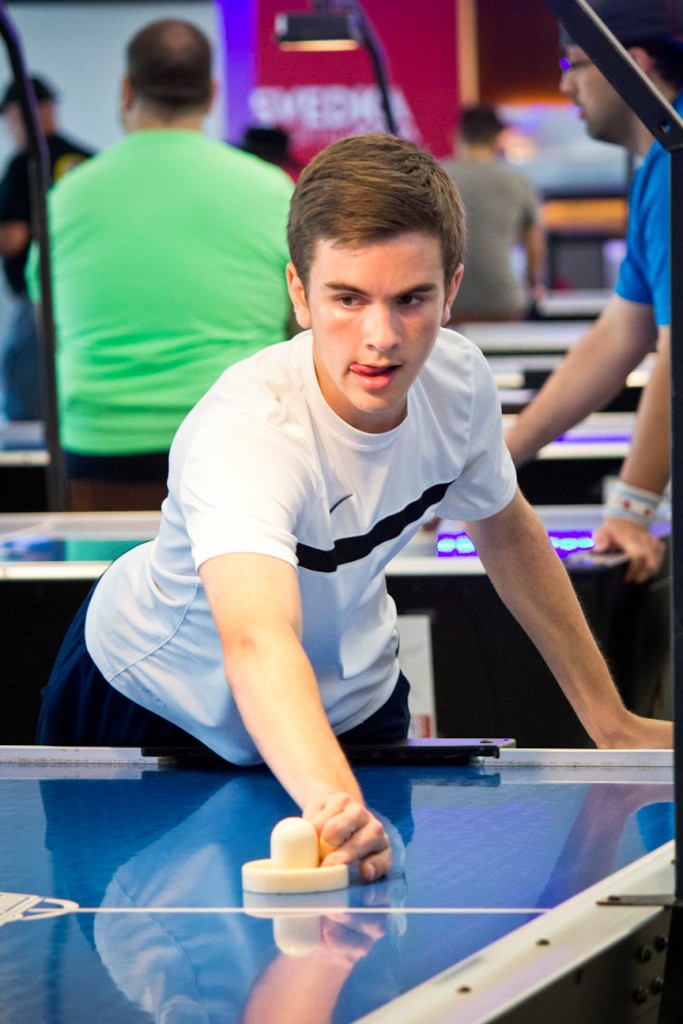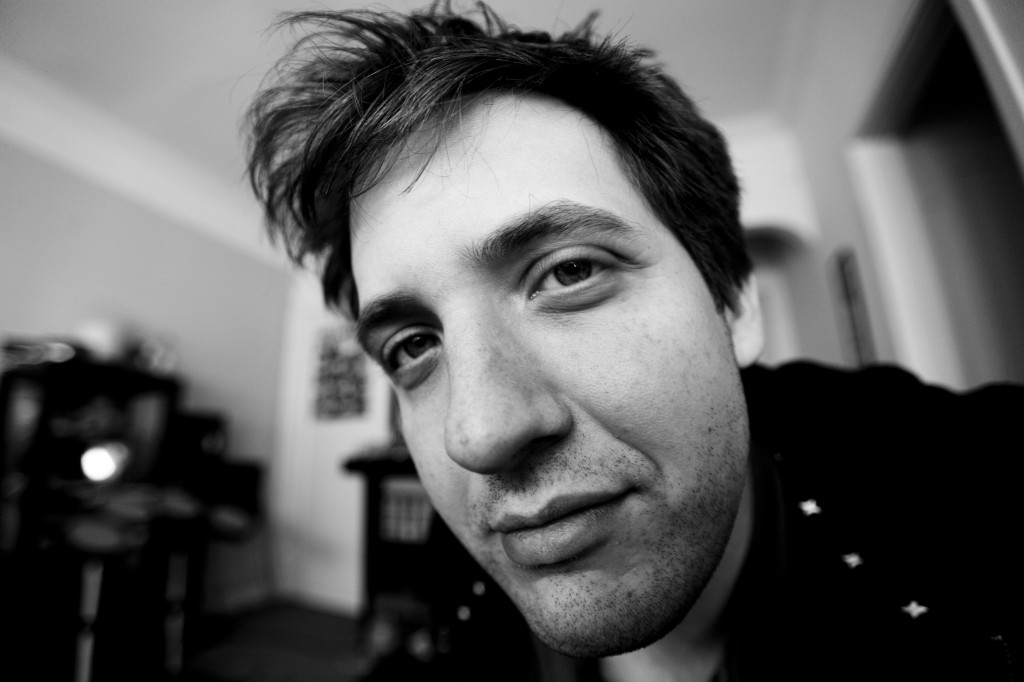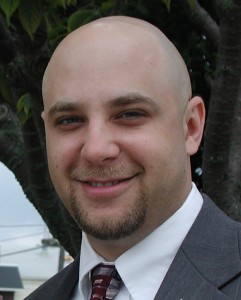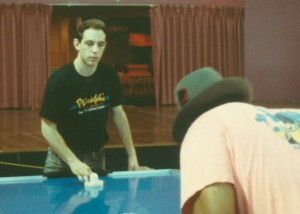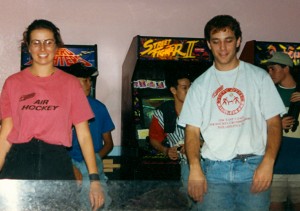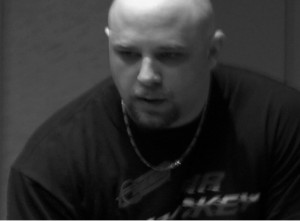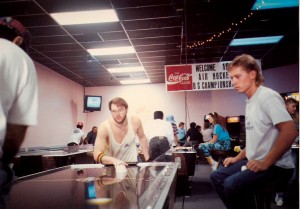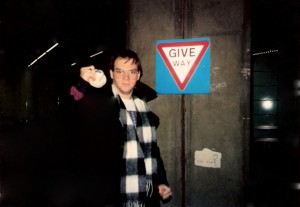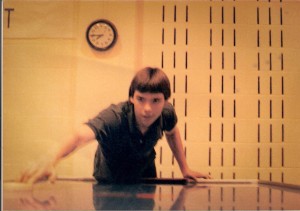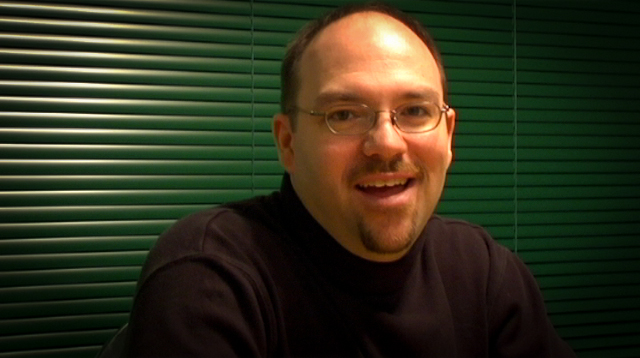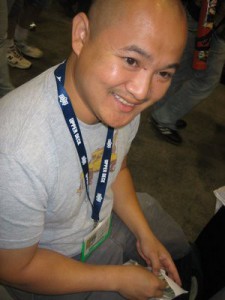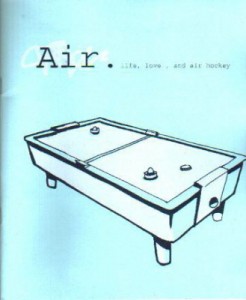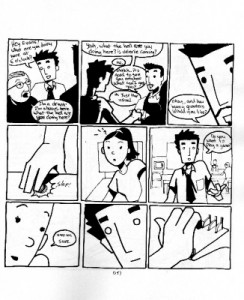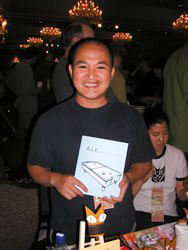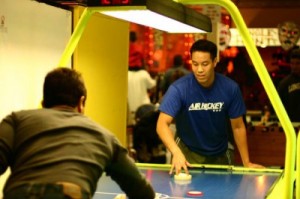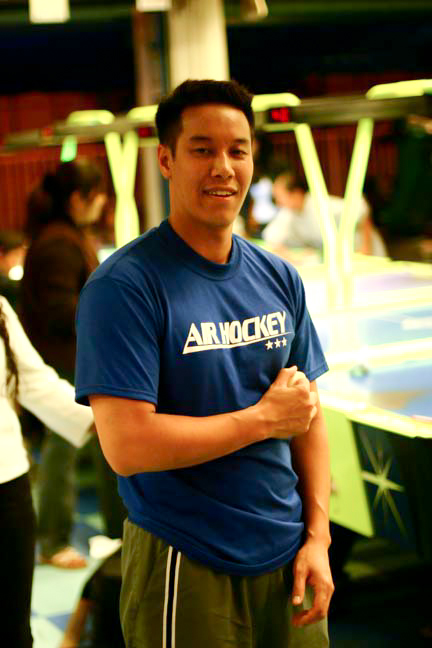The Best Air Hockey Player in the World is a 16-Year-Old “Kid” From Beaumont, Texas
Air hockey keeps getting older and so does the median age of its player base. The second wave of young players—who connected with the sport during the 1990s—are now firmly in their 40s. Players in the Old Guard are in their 60s. Sometimes air hockey feels like that Stallone/De Niro boxing movie, Grudge Match, for better or worse. Where is the new blood? The last (and only) time a teenager became world champion was back in 1989.
Colin Cummings recently changed all that by winning two world championships, back-to-back, as a 16-year-old. Although his rise seems meteoric, it was the direct result of six years of hard work—playing air hockey nearly every day and focusing on improving specific skills. His air hockey adventure began as a ten-year-old when his family moved into a house in suburban Houston across from frequent top-ten finisher Brian Accrocco and his son Steven. Cummings first played on a professional-style table in the Accrocco’s garage, and it was there that he learned about the humiliation of losing, and losing often.
WOTP: Why does air hockey appeal to you? The game came out of the 1970s and even the idea of a video arcade seems ancient now.
Cummings: Strangely enough, to me air hockey isn’t an arcade game. I’ve played in people’s garages, or in people’s houses, or at the movie theater, or at SRO in Houston, which has four tables. I’ve never really imagined it as an ancient arcade-type game. I thought it was new and fresh and it was never in my mind that it was old or dying out.
WOTP: At what point did you realize that this was something that you could be good at?
Cummings: In 2012 I competed in my first U-14 tournament for kids at the World Championships and I ended up beating Steven [neighbor Steven Accrocco] in the finals. When I saw that I could beat a kid who had been practicing and playing air hockey his entire life, I knew that I had some kind of skills. And after watching the final of the main tournament between Billy [4-time world champion Billy Stubbs] and Ehab [defensive genius Ehab Shoukry] and just seeing how much competition was going on and how many people were watching the tournament and how some of these people literally put their whole lives into it—I knew it was something that I’d stick with for a long time. That was the first time I felt could really advance in this a lot further and maybe someday become world champion.
WOTP: Why do you think you were able to surpass your neighbor Steven Accrocco? You had far less experience.
Cummings: I think I just wanted it a lot more than he did. When we first met he was the king and he’d already been playing air hockey for six years. At that point he probably thought he had reached the highest level. One day I started thinking about how I had all the same materials given to me—I had the same body size as Steven and we were both smart. I wondered why he could beat me and I couldn’t beat him. So before that day I’d go over to his house and maybe we’d play for an hour before hanging out or riding bikes or whatever we’d do, kid stuff. But after that day I realized that if I played every day more seriously eventually I’d start passing up people. And that’s just exactly what happened.
WOTP: Let’s talk a little bit more specifically about your game. What is your playing philosophy?
Cummings: I have about six different ways that I like to hold the mallet and each helps me with different shots. I have a lot of different ways to attack people. I definitely wouldn’t say that I practice shooting one shot 50 times and that I can hit it 49 out of 50—that’s not how I really work. I can shoot every shot and when I’m in the zone usually it’ll go in perfectly every time. I don’t have a lot of mess-ups in tournaments anymore. I like to have a whole bunch of different shots—I like to widen my artillery—to make sure that whatever kind of defense I’m put up against I have the perfect solution they might not be ready for. So one advantage is this huge variety of different tools that people aren’t ready for. Another is that I’m extremely fast and I run pretty much every day. And I come in with the attitude that I’m not going to stop—I’m not going to lay down—there’s no way that I’m going to slow down for anything.
Colin traveled to Colorado in 2015 to compete in the AHPA World Championships. Although his best finish ever was sixth place, he beat his neighbor’s father Brian Accrocco in the winner’s bracket final en route to dethroning the current world champion, Billy Stubbs, in the championship. Colin became the youngest world champion ever, although some grumbled because this was the first tournament promoted by the divisive, upstart AHPA, and fewer players had attended.
WOTP: Do people ever try to delegitimize your championships by saying you won against a weak field? There are people who always talk, right?
Cummings: A lot of people did say that after Colorado but those words probably affected the people around me more than they affected me. I knew I had just taken down the champion and if people thought they were going to give me a harder time than him, well, that didn’t make much sense to me. I was happy that I won either way. Some people said, “The only reason Colin won is because there was a low turnout,” so I was expecting somebody to challenge me for my ranking. But nobody stepped up. Nobody said, “I’m going to take out this little sixteen-year-old kid.” Everybody just got quiet.
WOTP: Can you talk about your next tournament?
Cummings: A little after the Colorado Tournament the USAA announced the World Championships in Houston. This was going to be the tournament where all of the old players came to take back the title from me, thinking that I didn’t really deserve it. The turnout was going to be a lot larger and a lot of the big dogs like Wil Upchurch and Andy Yevish were going to fly in. Billy Stubbs was going to be there and Danny Hynes and Ehab Shoukry and some of the Venezuelan players. It knew it was going to be a great experience. I thought, “Okay, I’m going to have to just win this one too!”
WOTP: What do you think about the Venezuelans and their style of play?
Cummings: I love all of the Venezuelan players. Every time I went to a tournament I always end up walking over to them and saying, ”I love your game; I can’t believe you can do all this cool stuff!” But before this tournament, Pedro [4-time runner-up Pedro Otero] pulled me aside and told me: “It’s going to be me and you and we’re going to play in finals. And I will not lose. I will not lose.” I thought, “Man, I’ve never beaten Pedro before and he’s an angry Venezuelan guy who can kick butt!” But I just said, “Okay, let’s get to the finals!”
WOTP: Were you able to compete against many air hockey legends at this tournament?
Cummings: I was able to play against almost everybody. I played Andy Yevish a lot especially since he was my double’s partner. I played Billy [Stubbs] one practice game and I think I played Ehab too in a double’s game and I definitely played Tim [10-time world champion Tim Weissman] and Jesse Douty [11-time world champion]. And even Jose Mora [3-time world champion]. I played all of them. I had a huge smile on my face the whole time. In singles I was able to play against Wil Upchurch [2-time world champion] again, who is this gigantic man with a great beard and scary glasses. I thought he was going to destroy me! And somehow I was able to beat 11-time world champion Danny Hynes, who has crushed me so many times before. He beat me the first two games but I didn’t give up. I said, “You know what? I don’t care. I’m going to play him even harder!” And I started shooting more off-goals and outspeeding him and using his best shot against him, which is the right-wall-under. And I kept myself in the match by stuffing his cuts, which didn’t make him happy!
WOTP: Can you describe what it was like playing Pedro Otero in the finals?
Cummings: Pedro ended up beating Danny [Hynes] to win the loser’s bracket. Danny and Pedro are really good friends and Danny was taking him down. He was actually up 3-0 and then somehow Pedro came back and won four games in a row. He was on fire—I thought he was this giant coming up to take me down!
Afterwards, Pedro came up to me and said, “See? It’s me and you now. It’s going to be a great match!” And I just said, “Oh man!” Pedro and I played three years ago in Chicago and he beat the nuts out of me, 4-0. That definitely wasn’t my time. I wasn’t anywhere near the right level. I remember him pounding the hardest right-wall-unders that I’d ever seen. And you know it’s coming. You just know it’s going to be a right-wall-under right in your face and you can prepare for it all you want but he’s just going to shoot it anyways. And it’s just so fast that I wasn’t ready for it at the time.
This time I knew it was coming so I knew I had to hold the mallet in a way so that I didn’t have any fear of how fast the puck was coming. I couldn’t be afraid of getting my fingers hurt and after a while I gained confidence. A couple of times when he shot his right-wall-under or right-wall-over I charged it and after charging it a couple of times I knew that he was a little bit iffy on whether he should shoot it or not. And whenever I saw him thinking about it that’s when I could tell what shot he was going to shoot. On offense I went with a lot of cuts and cross-straights. The Venezuelans don’t play as much of a set-up game as we Americans do so they are not as used to it. Plus I did it a lot faster.
The hard-fought final went to seven games, with Cummings prevailing over Otero in the last game 7-5. Although some players had dismissed his previous victory in Colorado, Colin silenced his critics by defeating a deep field in the best-attended tournament in air hockey history.
WOTP: Now that you are world champion do you feel any pressure to retain your title?
Cummings: Yes, but probably less pressure than past champions have. If people beat me then I have a lot of time to come back and beat them again. The first person that’s going to beat me could be anybody. Mostly it depends on how much I want to keep my skills going. All I think about is getting myself better, getting the people around me better and just having fun in air hockey right now, that’s all I can do. Because as soon as I lose the fun that’ll be the day that I lose a tournament.
WOTP: So air hockey is still as fun as it was?
Cummings: It’s a different kind of fun. Before it was fun to just hang out with my friends—people who were the same age as me—and talk about air hockey and other things. But as I got better people didn’t want to play me anymore because they knew I’d just wreck them without even trying!
WOTP: Are younger people gravitating toward air hockey or are you a singularity here? How does the future look for the sport?
Cummings: About 20 people in my school are really interested in air hockey full force and are going to try and play in the next world tournament with me. I think there’s a bright future ahead for air hockey but we’re going to have to put some work into it. I see a whole lot of things we can do in the future. I want to start setting up air hockey clubs more widely in different areas. I’m going to fly to the Air Force Academy in Colorado; I’m going to start a foundation here in Beaumont before I leave. Once we just establish certain areas we’ll be able to get more and more air hockey clubs set up everywhere and we’ll have a lot more people that will be interested. Our goal should be to keep new players, not just show them air hockey one time and then let them go off.
WOTP: Is there anything else you’d like to add?
Cummings: Everybody really does like air hockey! If I bring it up in conversation, people will usually say, ”Man, I love air hockey; I want to go play that.” Sometimes the hard part is just getting a table somewhere, getting a nice location, getting players together.
◊◊◊
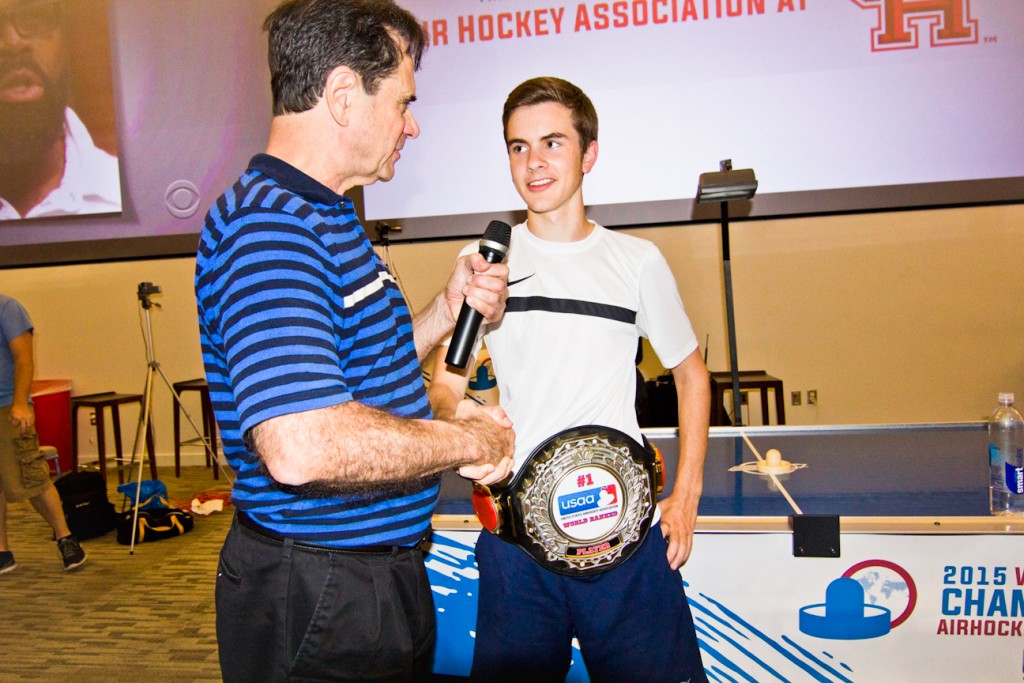
Rise of the Machine: An Interview With World Champion Billy Stubbs
Billy Stubbs is a 39-year-old creative director based out of Chicago, Illinois. He started playing air hockey seriously in 1993 while living in Georgia, trekking up to Atlanta every weekend to play with eleven-time world champion Jesse Douty. After finishing 48th in his first national tournament, he decided he needed to practice even harder and dedicated himself to systematic, rapid improvement. The following year he placed fifth, a result that raised eyebrows, and in 1995 he came out of nowhere and rolled through a deep field—beating champions Tim Weissman, Jesse Douty, and Wil Upchurch en route to his first national championship. He was twenty years and six months old, the third youngest champion of all time. Although some predicted that youthful Stubbs’ disciplined, analytical approach would deliver him several championships in the 1990s, he went seventeen years without winning another one. In 2012, at the tender age of 37, he finally became world champion again, prevailing first in Las Vegas and later in Houston that year. He won his fourth world championship in 2014.
Stubbs plays an unflashy, rational style of air hockey—some call it “robotic”—which has earned him the nickname “The Machine.”
WOTP: It took you seventeen years to win another championship. What happened?
STUBBS: I think that after I won that first one I had a motivational lapse and didn’t take it as seriously. Maybe I took it for granted—being young and winning. And thinking I could win by just staying at the same skill level I was at. I went to tournaments the next few years and started dropping down to 7 and 8 finishes, not horrible but not contending either. And then some time passed where I didn’t play but once or twice a year and it really showed in my results. In the next seventeen years a lot of other good players came up as well.
WOTP: So what changed for you?
STUBBS: Well, in 2009 a couple of guys here in Chicago, Dan Meyer and Brian Quezada, came out of nowhere. These guys took air hockey really seriously and wanted to play all the time and learn. And I was happy to have them being so passionate and dragging me out to play two to three times a week. That was great. After playing regularly with them for a couple of years I made the decision that I was either going to quit air hockey or make a big push to be as good as I could be. I realized that I’d played this game recreationally for almost two decades and Father Time was kicking in. Also, just being in my late thirties gave me a reason to want to be healthier and be in better shape, and using air hockey as a tool for those things was perfect. So I lost 42 lbs in 2011. I got in great shape, started playing every day, had better practice players with Brian and Dan, and took the game more seriously.
WOTP: Did you have regular workouts? What was your plan?
STUBBS: What I did was model my training regimen—which is 5 days a week, 2.5 hours a day on the table, plus cross training and video study—after the U.S. Olympic table tennis team. I was looking at how pro tennis players and pro basketball players did it. And I took a big look at MLB players and table tennis players to see what their training regimens were like and what would happen if I applied that same training to air hockey. I think the one that worked best was the one I just described—the U.S. table tennis team regimen—and the results show.
Also, I always have a three-month calendar of what I want to work on—regardless of whether a tournament is coming up or not. I think that the biggest difference is before a tournament the calendar gets a lot more granular. There’s a lot more detail on it because I’m making a bigger and more focused push. That’s the way I get my head around staying in air hockey—I give myself small milestones that are laid out weeks to months in advance.
WOTP: So you’re winning just because you’re outtraining everybody.
STUBBS: That’s exactly right! The reason I’m winning because I’m outtraining everybody! I think you see that in everything across life. The people who are successful are, by and large, not the people that have the natural talent. The people who are successful in business or sports or whatever are the people who put in long hours. Look at Roger Federer: He practices tennis eight hours a day on the court and video studies for two hours a day and he sleeps for twelve hours a day. So his life is tennis and you see that in the results. He is the greatest tennis player of all time.
WOTP: Applied toward air hockey, this approach seems both highly rational and totally crazy!
STUBBS: Yeah! When I was younger I loved playing air hockey but I was always aware of the public perception of it as a kid’s game—not something to be taken seriously. That was something that was always in the back of my mind, maybe on a subconscious level. But as I grew older I became more comfortable in my own skin and realized that air hockey makes me happy and I love playing it, so I’m going to make this push and I no longer care what anybody thinks. And I’m happy that I did it because it’s something that I’m really proud of.
WOTP: But how much of this good feeling is results based? If you were finishing in fifth or sixth place would you still train like this?
STUBBS: That would be really tough. I wouldn’t feel the same for sure, because I’d realize I was outpracticing everybody by a large margin. And if I’m still doing that and Danny [Hynes] is beating me when he plays once a week for an hour a day, it’d be tough to come to terms with!
WOTP: As a creative director and marketing expert do you have any opinions on how to increase involvement in the sport?
STUBBS: Right now we’re in such bad shape and I think it’s obvious. We need to improve our brand image; we need to get a website presence that is decent. We need to do a few other very basic blocking and tackling things—just very basic things that anybody else in business would do to help make their business grow. The problem is we just don’t have people willing to put in the time to do these things. These things take man-hours and we just don’t have people willing to put in that time.
I’ve said that if I win five tournaments I’m going to step away from playing fourteen hours a week. I’ll dial it down to about an hour a week and then I’m going to turn my attention more to marketing and promotion of the sport. So I’ll take those twenty hours a week that I’m dedicating to air hockey practice and flip them over to marketing and trying to help us grow. But right now I just don’t have time to practice and promote at the same time—that’s asking a lot of people.
WOTP: Do you ever feel any resentment? I mean, why does it have to be you who does this?
STUBBS: I don’t feel resentment because I haven’t done it yet either. I’ve never invested twenty hours a week into marketing air hockey, so how could I ask other people to do it too? No, not resentment, just disappointment.
WOTP: Any final comments?
STUBBS: Just get out there and try hard at something and take it seriously and get good at it. Simple story, you hear it all the time; people don’t do it. And I’m guilty of not doing it in my day job and other things in my life. But if you are committed to something you’ll see results.
Practice makes perfect. I heard it in band all the time when I was kid!
Billy has written dozens of insightful articles about air hockey tactics, mechanics, and training methodologies at his blog, Say AH. It’s a gold mine for anyone seriously interested in improving at air hockey.
Check it out at: http://billystubbs.wordpress.com
Interview With Director Eric D. Anderson Over At the Indieflix Blog
“Cinema is an emotional medium first of all, and an intellectual one later. Movies have this effortless ability to forge an instant connection with the viewer and transport them to another place and another time, and this is what I find so compelling. We want to be transported. We want to be affected, to feel. It may seem strange for a documentary filmmaker to be speaking in these terms, but I think it’s important to remember that the viewers are going to respond first to an emotional connection with the material, even if it’s a documentary. Especially if it’s a documentary. You must forge this emotional bond with the viewer…otherwise you’re a failure. Then you’re about as interesting as an insurance seminar.”
Filmmaker Spotlight: Eric D. Anderson | The Indieflix Blog
There’s also a link at the bottom of the interview that connects to the entire uncut interview with Anderson. Check it out!!!
Lost Interview With Venezuelan Sensation Pedro Otero
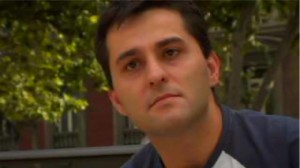
Pedro Otero
If Jose Mora is lithe, lanky, elegant Seattle Mariner Ichiro Suzuki, then Pedro Otero is power hitter Hideki Matsui. All honed their skills playing professionally abroad, then emerged as dominant “rookies” on the international scene. Unbelievably, Otero competed in only four world championships, finishing second in 1998, 1999, and 2000, and finishing fifth in 2001. It is a masterfully short career, and Pedro has probably the highest average finish-per-event in air hockey history. Known for his rock-solid defense, and uniquely powerful (and difficult to defend) right-wall-over, Pedro lived in the competitive shadow of his friend and fellow countryman Jose Mora, who edged him out in three successive tournaments.
We traveled to Madrid to speak with Pedro back in the summer of 2004. The footage was never used in the film, but we wanted to publish a short excerpt of the interview and wish him well.
WOTP: Can you tell me how you got started?
PEDRO: I began playing in the city of Caracas in Venezuela in 1994. I was seventeen years old, and I began playing with some friends. We played our games at Arcade City, which is where we played for many years. Over time, more people joined us. My normal practice partner was Jose Mora. We spent a lot of time practicing together. I can say that our levels were equal because of our consistent practice. We practiced very often, practically every day, and that helped us reach a level that allowed us to travel in 1998.
WOTP: How did that all come about?
PEDRO: In 1998 Jose and I decided to travel to the international tournament in Santa Cruz, California. Tim Weissman helped us in our adventure –- to find some manner to travel to the United States. He made a collection of money amongst the players over there. And he facilitated ticketing information and things like that. I can say that if it were not for him, I believe that we would never have been able to go.
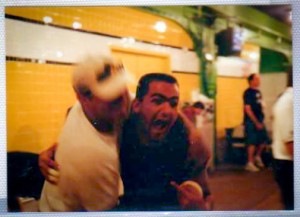
The exuberant Jose Mora
But we still had to embark on a 79-hour one-way bus trip once we arrived in the United States, without knowing, really, what expectations we had for winning, nor having been able to compare or contrast or playing level with the players there. I realize it was a stupid thing to do, an odyssey based more than anything on youth. But in reality, I’m sure neither Jose nor I regret it. And the fruits of this [Jose and Pedro finished first and second place] demonstrate that it was worth the effort.
WOTP: Were there style differences that allowed you succeed against the US players?
PEDRO: I believe that our style is different because in Venezuela we had many more players to compete against – the player base in Caracas was larger than any other city in America, except maybe Houston. There was more of a variety of rivals, which is why I think our style had to be much more complete. We could not just mold ourselves to the characteristics of one player. We had to have a game that was more compact and as complete as possible.
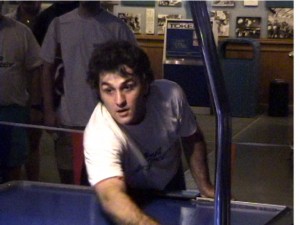
Pedro hits his unique RWO (Right Wall Over)
When I beat Tim Weissman in the semi-finals, I can say that is the biggest moment that I have lived inside of air hockey. And one of the best moments of my life, without a doubt. I can still remember that moment, everything that surrounded it, how I got to that moment. I can say that although I was beginning my career in air hockey, it was the culminating moment as well.
WOTP: How did you end up in Spain?
PEDRO: In the year 2001 I was trying to go live in the United States, because the situation in Venezuela wasn’t adequate. Andy Yevish helped me a lot. He was very helpful. Lamentably, in the end, things could not be. But I am still very grateful to him.
My family members and I decided to come to Madrid, but there is really only air hockey in one city in Spain, which is Barcelona. Generally, this isn’t very good for me because it is about 600 kilometers away. In all sincerity, it was very hard to stop practicing air hockey so much after eight years of uninterrupted play, but there came a moment when I had to recognize that life has other priorities.
WOTP: Do you miss it?
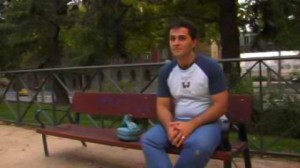
Pedro’s new home: Madrid.
PEDRO: Truthfully, air hockey has given me many good moments, some of the best moments in my life. It has helped me feel that I can attain what I set out to do. In some ways I feel empty having left air hockey. But if were up to me –- under ideal circumstances –- I would have continued playing for the rest of my life.
Air hockey is a sport that teaches you the skills to better yourself in life. And for me, it has helped me realize myself as a person. Others I have played with have made the same comment –- that it’s extremely fun and competitive, and you enrich yourself as a person while playing it.
But one of the best things about air hockey is that you become like a small family, and always maintain contact. We always know about each other. And wherever you go, other air hockey players will know you are there and seek you out. It is something like a chemical between us, between all of us who have played. And that is something special.
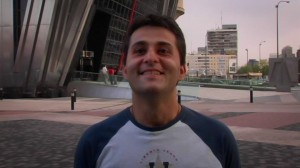
Vote for Pedro!
Thanks, Pedro!
Philosopher Lou Marinoff Weighs In On the Importance of Air Hockey in Our Society
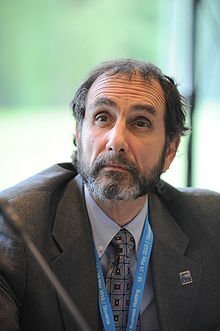
Lou Marinoff
Like many fringe sports, air hockey is an activity that inspires profound existential questions in those who love it. Nostalgic documentaries like Ken Burns’ latest effort seem like easy, non-threatening missions — we love baseball, it is our national pastime, and we also love our love of baseball, which usually harkens back to an earlier time in life, when we were more innocent, when players were drug-free (well, just a different kind of drug — speed, perhaps), when these athletes were real role models, heroes even.
What’s harder is placing air hockey (or darts, or shuffleboard, or baseball card collecting) in a similar context. There is no assumed national love for these activities. The same passion that is celebrated in Ken Burns’ beloved Baseball or Tenth Inning is called into question when looking at air hockey. But should we not celebrate passion for passions sake? How obviously worthy is hitting a ball with a stick and running around to different safe zones like a grown-up game of tag?
Three-time table hockey champion Lou Marinoff has given much thought to these very questions. As a philosopher and author, it’s difficult for him not to ruminate at length on society’s indifference to these outsider sports — why it is that the very that you’ve been chosen to do — that you excel at — is kicked to the curb, or even worse, ignored. And what to do about it.
We spoke at length to Mr. Marinoff about these and many other issues.
WOTP: What are the differences between air hockey and table hockey?
LOU: There are many differences between table hockey and air hockey, although they are related to the same pure form, as Plato would have it: the form of hockey. The whole idea is that you have a game with boundaries and you try to put a puck into a net. How many players you have, what kind of puck you have exactly, whether you hit the puck with a stick or with some kind of a knob depends naturally on the kind of game you’re playing, but it’s all related to hockey.
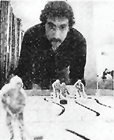
Lou on the prowl
The main thing is: With table hockey you have a team of players, which makes it look like ice hockey in miniature. You generally have a goalie and defensemen and wings, and you have the capacity to move, pass the puck back and forth. And generally one of these players will do the scoring.
In air hockey you have to do it all. You have one player who is basically controlling offense and defense together, very quickly. The transitions are very fast. And so the game is much faster. There are fewer possibilities in terms of who you are going to pass the puck to. There’s no one to pass the puck to, but you have to make a play off the boards or make a great defensive play, so there are similarities and differences, but it’s based on the same concept.
WOTP: Why does this appeal to you?
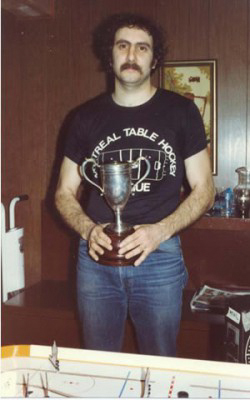
To the exhausted victor go the spoils!
LOU: There are a lot of reasons why this is interesting to me as a philosopher and as an educator, and the first one has nothing to do with hockey. It has to do with a bigger facet of the human being, and that is games and play. We are not the only animal that plays. The other primates play a bit—otters play, dogs and cats play occasionally—but human beings have taken and evolved the concept of games and play to a really high level and a lot of our lives are consumed with playing.
Playing is very important to children for their development and play is important for adults, one way or another, whether it’s games or sports. Most of us end up playing something on a lifelong basis. Music is play. That verb “play” applies to a lot of facets of human existence, so it’s obviously something important for our species. And then the question is, where do you grow up, what part of the world are you from geopolitically, so what are you going to be exposed to when you’re young, in terms of games? Hockey? This is a game more for the northern latitudes and kids grow up with great passion for it, whether it’s table hockey, ice hockey, field hockey, air hockey, it’s all part of the same great game.
WOTP: But is it always play? Or is it something else?
LOU: Philosophically this is interesting: What is a game doing? When we play a game, basically we engage simultaneously between competition and cooperation. We need to compete with each other because often competition brings out the best in a human being. You discover your excellence sometimes only when you’re under pressure, when you really have to come up with a great play, you know, come up with the goods! That’s what spectators come to games for, right? They want to see the athletes performing at a high level. So competition drives us achieve our best in terms of performance. But we also have to cooperate. Table hockey, air hockey, ice hockey—these games teach sportsmanship because you need the other person to compete. You go out there by yourself and you don’t have a game. You can go out there and skate around or just move the puck around, but you actually need another person to compete!
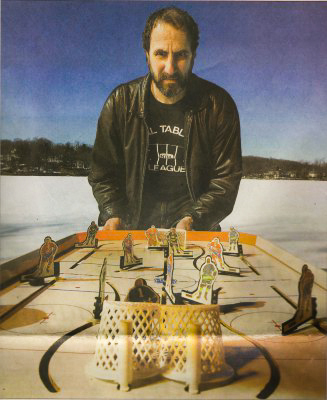
Toy? Game? Sport? Or something larger?
WOTP: I guess what I’m getting at is, well, is there some kind of line between game and sport and where do you draw that line?
LOU: Really it has a lot to do with the medium in which this game is being enjoyed and witnessed and are being transported. If you ask the manufacturers what they are selling, very often they don’t even think it’s a game… they think it’s a toy. Table hockey had this problem for a long time. The people who made it were toy manufacturers, and only understood toys.
Then when they say, “Hey wait a minute, grown men are taking this seriously, okay it must be a game. It’s got this competitive edge; there’s a lot of sophistication in it.” As in air hockey, I’m sure, there are very sophisticated plays that can be made and so forth.
So it looks like a game. But what happens to the top players when people get really good at this game? They find other people who are also really good and have achieved a great level of play, and then they want to compete seriously. At that point it’s sport. At that point it starts to taste like a sport. It’s not just a game anymore.
But it is a little different with air hockey and table hockey. Why don’t we look at pro football players, hockey, soccer, and say: “You’re playing a kid’s game, what’s wrong with you?” Of course they’re playing a kids game! The only way you could ever get to be a professional is to start early enough in life and get the muscular memory going—get the techniques into your immature neurological systems—so as you develop into a human being you have those skills!
WOTP: Do you ultimately think there is something rebellious about mastering an antiquated table game like this?
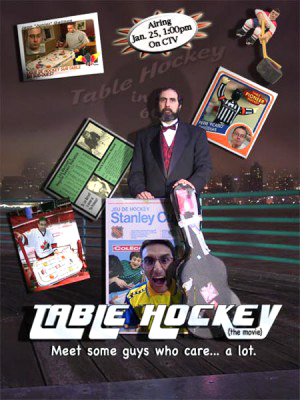
Lou’s other worthy film: Table Hockey (the movie)!
LOU: Well, the car was invented a while ago and it’s still with us. If you look at tennis racquets and baseball bats and footballs and soccer balls… there are a lot of things that were invented decades ago—maybe centuries ago—that are still with us! So I wouldn’t be too prepared to dismiss something just on the basis of its antiquity!
Sports evolve, however, and I think the point that you make that is really interesting, is to look at the contrast between computer games and virtual games and real games. I’m claiming that one of the strengths of air hockey and table hockey is that they are real and not virtual. I think people want more reality than what they are getting.
Ultimately, you can look at a game like Nintendo, which captured worldwide a generation of children. It was a universal language, actually, for children. They could all get together and play Nintendo. Whether it’s Sega or Gamecube or whatever, the fact of the matter is that these are virtual and not real. The action is taking place on a computer screen, not in a three-dimensional space-time setting and the skill set you need—however adroit these people are at manipulating the control pads—it’s not the same kind of hand/eye coordination you need in reality!
So table hockey and air hockey both belong to a class of games that are played in space-time, 3d, with a real opponent standing on the other end of the table. And there is something there that is irreplaceable.
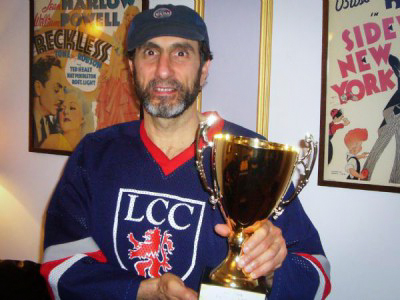
The Comeback Kid of table hockey!
We are human beings. As such we need to function in real terms as well as in virtual ones. And if you start asking people, “Which is better: e-mail or real mail?” Well, they’ll tell you e-mail’s faster, it’s cheaper, it’s instantaneous, we can communicate around the world and all that, but you know what, people should never forget about the satisfaction of writing a letter to somebody… and getting a letter from somebody. That’s something that you really keep and can cherish and reread and has a certain kind of value. I know that the visual tradition has unfortunately supplanted the written one, but people still need to appreciate the virtues of reality and if they can’t do it with literature and letters and stuff, because the e-thing is really what’s happening, they have to do it with sport!
And there is a certain satisfaction to scoring a goal in the real world that you will never be able to replicate in virtual terms!
—
Thanks, Lou!
Lou Marinoff is the author of many bestselling books, including The Middle Way, Therapy For the Sane, and Plato Not Prozac. His many areas of professional and personal interest are showcased at his website: http://www.loumarinoff.com/.
My Cousin’s Kid Interviews the Beast From the East
Two-time runner-up Andy Yevish was first discovered on the boardwalk of the Jersey shore, where as a lanky teen he beat former World Champion Robert Hernandez in an air hockey exhibition. Andy already had a reputation as an aggressive offensive player, and this shocking unofficial victory brought him into the fold of competitive play, where he immediately began finishing in the top five, including a 2nd place finish to air hockey wunderkind Tim Weissman in 1993.
Andy organized a couple of east coast tournaments in the early 90s, and took over the promotion of the World Championships in Las Vegas in the early 00s. As a player and as a promoter, he has been no stranger to controversy… but it is difficult to deny his formidable offensive attack, which remains one of the best in the game. Even so, Andy has been unable to translate his brilliant and powerful offense into a World Championship. At the age of 42 he is much older than the oldest air hockey champion in history and the question lingers: “Will he ever win one?”
Incredibly, my cousin’s 11-year-son, Henry, is still maintaining his high level of interest in the sport of air hockey. He asked if he could do one final interview, so I let him fire away on the self-proclaimed Beast From the East, Andy Yevish.
HENRY: The movie says that you have one of the best offenses of all time. Is that true? But Eric says that you play “all offense and no defense.”
ANDY: Hi Henry, Yes… I would say that the consensus is that I have one of the best offenses ever in air hockey. I have more shots, more variety, and more styles of play than most players. I can play both fast and slow, and can be deliberate, or fancy… But Eric is wrong if he says I play all offense and no defense. I think most players who play me will tell you I also have one of the best defenses. I vary my defense to the player’s strengths. I change my weaknesses. However, what Eric may be referring to is that one of the ways I play defense is what I call a “scoring defense” where the defense becomes offensive. I use my opponent’s taking themselves out of position by taking their own shot as an opportunity to hit a quick transition shot. It is a gambling strategy, as it is high risk, but high reward. I do not play that strategy all the time though.
HENRY: What is your best craziest shot that other people don’t do? I want to crush my friends at air hockey!
ANDY: Well interestingly, the crazy shots usually aren’t the best shots. A well-aimed, well set-up shot is the best way to beat all your friends. Stop the puck every time you get possession, then set up your own well-aimed shot. Taking your time, and hitting from your power area will help you beat all your friends.
HENRY: In the future is air hockey going to die?
ANDY: Well, I don’t know the future, but I hope not. There are plenty of people working hard to keep it alive. My best guess it that it should a least be able to maintain itself, but in order to get big, some major changes will need to be made. I think a television show designed to showcase ai hockey competition in a 30-minute format would be a good vehicle to get it noticed. From there, air hockey related equipment and clothing could be the thing that gives air-hockey eternal life.
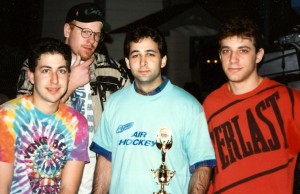
Andy and the innocent East Coast Crew, before Andy lost his shirt contract with Everlast. Product placement wasn’t so subtle back then, I see.
HENRY: The movie says you were a boxer. Is it fun to punch people in the face but not get in trouble?
ANDY: Heh-heh… One might think of it as being fun… and boxing to me was fun, but I don’t think of it as hitting people in the face. I think of it as an art form. Much like I think of air-hockey as an art form. When you are boxing, you often forget it’s a fight and think of it as a sport… Sometimes, you have to suck it up and dig down to primal instincts… usually late in a fight, or when you’re tired or hurt, and that’s when you remember you’re in a fight, and you realize you’re hitting each other. At that point, no… it’s not fun.
HENRY: Do you train like Rocky the boxer before a big tournament? What are the exercises to prepare the air hockey muscles?
ANDY: It used to be well known that I used to physically train before tournaments, and not drink, smoke, and abstained from women. That was before I got married, and older and I was only in good shape if you consider “round” a good shape. Recently I have gotten in better shape than I have been in 10 years (not how I look in the movie). I never trained for air hockey in particular, but I had back problems, so I trained in order to have the endurance to play my best without pain. My workout regimen now (which I do all year) is I bike 10 miles a day, do a 20 minute ab routine (which keeps the weight off and strengthens the muscles to keep my back from hurting), I do about 120 pushups a day (4 sets averaging 30 each set with vared arm placement… but more reps in the earlier sets). Then I hit weights 3 times a week (about every 2-3 days.. I do 4 sets of 15 reps with 25lb dumbbells of each of the following exercises- bicep curl, tricep press, military press, and chest flys. When I do get a chance to get to the gym, I do some other exercises, like bench pressing and butterflies but with my lifestyle it’s hard for me to get there. I will soon be adding squats to the routine on off-days.
HENRY: Do you have a secret grip?
ANDY: I don’t have any grip that is a secret. I actually vary my grips on the mallet, depending on the action I want to get on the puck. As a general rule, a tighter grip will get you more arm power, and a quicker release. A looser grip will let the mallet do more of the work (especially when you hit it with follow-through) and get more action (like slice) on the puck.
HENRY: My dad wants me to ask is the Jersey shore really like on that TV show?
ANDY: Unfortunately… yes.
—
Thanks, Andy!
Andy Yevish is a portrait artist and entrepreneur who splits his time between Wildwood, New Jersey — where he owns two stores on the boardwalk (Fame and Superstars) — and Sherman, Connecticut, where he enjoys a more rustic existence with his air hockey averse wife, Anna.
Interview with the Young Wolf: 10-Time World Champion Tim Weissman
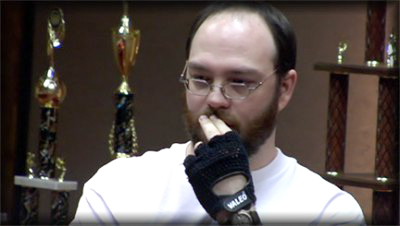
Tim “Young Wolf” Weissman
Two weeks ago two-time World Champion Wil Upchurch described a pivotal moment in his development when he was confronted by 90s pop sensation Seal and air hockey wunderkind Tim Weissman in the parking lot of a Houston gameroom in 1991. Only one person has won more air hockey World Championships than Tim Weissman—the mercurial Jesse Douty, who won eleven titles back in the air hockey Stone Age (the late 70s and early 80s). But few can dispute that Weissman took air hockey to a whole new level after dispatching Douty permanently. Weissman pioneered radical offensive and defensive playing styles that dominated competitive play from the late 80s to the mid-90s.
Many say that the best air hockey ever played was played by Tim Weissman back in the early 90s. Like many things in air hockey, of course, this claim is in dispute. But no one can argue that Weissman wasn’t the most revolutionary air hockey player of all time, when one looks at the level of play before and after his reign.
Previously, my cousin’s 11-year-old son, Henry, conducted an interview with current World Champion Davis Lee Huynh. We were delighted to hear that Henry’s interest in air hockey continues, and that he expressed a desire to ask some questions to 10-time World Champion Tim Weissman.
As before, I corrected some grammar and spelling but the questions are his. Here they are.
HENRY: Do you like Texas?
TIM: I love Texas! I’ve traveled around the country quite a bit as an adult and honestly, I have not found any other state with as much to offer. We have mountains, forests, rivers, ocean, desert, plains, large cities, small towns… It is over 700 miles from the east tip to the west tip. Plus, the American spirit is still alive and well down here. We don’t have an income tax, and the government is still friendly to business. But, above all that, we have the best air hockey players in the World. Sure, we have seen a few “decent” players come from other places, but nothing close to the amount of talent which has spawned from the Lone Star state!
HENRY: Are you the best air hockey player in history? The movie says you are.
TIM: Well, if a movie says it, it must be true. In all seriousness though, I think I am one of the best, but I can’t claim to be the best. I don’t think anyone has ever held a tighter grip during their reign than I did back in the early 1990’s. I won 9 consecutive World Championships and 28 major championships in a row over 5 years. But, I was pushing the envelope and folks had never seen many of the techniques I was using, such as the Circle Drift, quick release and the true “out” defense. Once those became part of the culture of the sport, people caught up and we have seen some phenomenal players since that time. Danny Hynes and Wil Upchurch, at their primes, were pure freaks of nature on the Table, unleashing offensive onslaughts never seen before!
HENRY: Tell me your SECRET. And don’t say “practice”.
TIM: Obsession. When I was on my 5-year winning streak, I ate, drank, slept, dreamed, imagined, thought, felt, inhaled and lived air hockey. I maintained the killer instinct in each and every tournament. When I was ahead in a game 6-1, and only needed a single point to win, I had the thought in the back of my head that I was in imminent danger of losing and had to push hard to finish my opponent off. I constantly felt that I was on the edge and could lose at any moment. It was when I started losing that edge, that hunger,the streak came to a close. I would go so far as to say that this is a good secret for any aspect of one’s life where you want to succeed or be the best. Certainly, you don’t want to lose yourself in your endeavors, but without a pure and real fire in your belly, it is hard to be great.
HENRY: Who has the craziest playing style in history?
TIM: Randy Lind, hands down. Oh, you said craziest style, not craziest person. Just kidding Randy! His style is very off-the-wall. He plays with a mallet attached to each hand, and he switches between them as he executes his attack. It can be very deceptive to newer players, but ultimately, I think when you have too much going on, you confuse yourself on a certain level. I am a big believer in keeping it simple. That’s part of what makes the Circle Drift so effective. It is very basic and simple on the surface, but from it, there derives infinite possibilities.
HENRY: Did you ever lose and feel really bad? When was that?
TIM: Every time I lose, I feel really really bad. Losing sucks. Even in my life today, I experience losses of various kinds. But, I learned some amazing life lessons from my experiences of loss in Air Hockey. First, and foremost, I learned that I hate to lose! And, that winning feels just so much better! But, more importantly, I learned that I never really understood how great it is to win until I really knew what it was like to have lost. It gave me a richer appreciation for winning, and it helped me stay humble. I also learned that losing is just a step toward winning.
When we lose, we look at what happened and analyze. We find out what contributed to that loss and how we can overcome that obstacle in the future.
HENRY: Do you make your children play air hockey? How old are they?
I have a 14-year-old boy, 10-year-old girl, 5-year-old boy and a 1-year-old boy. My children are required to play 5 hours of air hockey each and every day! Actually, the older ones play because they enjoy it. They are always begging me to practice with them. Most of the time, I am too tired from a long work day. Jacob, my oldest, won his age division at this last World Junior Championships. He is much better than I was at 14, but then again, I didn’t have a Table in my garage or a World Champion to teach me. My daughter is getting pretty good too and has a mean right-wall.
I’m glad you asked about children and air hockey though, because I do want to say that the only way I see air hockey ever growing beyond where it has been in the last 30 years is by involving children. Arcades and game rooms are pretty much a thing of the past, so where do we get our new players now? This question must be resolved for air hockey to make a leap forward. I have an answer, and I plan to try some pilot programs with the support of Mark Robbins and his new air hockey manufacturing company, Shelti, in days to come.
HENRY: How long can you hold your breath?
TIM: Funny you should ask…I actually have pretty decent lungs. I can stay underwater for around 1 min 30 seconds, give or take. One of my other interests is swimming. There is nothing more peaceful than swimming underwater across an Olympic size pool. It’s a great warm-up before a championship air hockey match!
Thanks, Tim!
Tim has a large rambunctious family and a large rambunctious array of interests. In addition to earning a Ph.D. in counseling psychology, Tim has been the owner of a special events company since 1996 and the owner of a Fish Window Cleaning franchise since 2008. His website is: http://www.fishwindowcleaning.com/619/
Interview With Thien Pham, Author of ‘Air’, the First and Only Air Hockey Minicomic
One of the great pleasures of making Way of the Puck has been discovering air hockey’s unexpected—but far-reaching—influence in the arts, sciences, and popular culture. Air hockey won’t really go away; it’s connected to math and music and robotics and a hundred other disciplines.
In honor of Comic-Con we decided to publish an interview with Thien Pham, a minicomics artist we met at the Alternative Press Expo in San Francisco. Thien is the author of Air, a one-off comic book (graphic novella?) about “life, love, and air hockey.”
WOTP: Why did you decide to make Air?
THIEN: At first I was thinking about doing a foosball comic. There are many similarities to playing foosball and doing cartooning… the small communities are really passionate. But I thought a more fast-paced and one-on-one-type sport would be better, so I decided to try an air hockey comic. And I assumed that because there’s pro foosball and darts, there had to be professional air hockey. Lo and behold, they’ve held tournaments at this place in San Jose by my house this whole time! So I went to one and I was totally blown away by it. I just thought it was so amazing, so I said, “Okay, I gotta do this!”
WOTP: What’s it about?
THIEN: I always describe it as an 80s movie. One of the inspirations for this was the arm wrestling movie, Over the Top. Air is about a guy whose dad was a pro air hockey player and got injured playing. So this guy, his son, was really good himself, but he kind of quit playing for various reasons—work and girlfriend being two of them. At the end he decides that doing what you love is the most important thing, so he decides to pursue air hockey again and actually plays his rival, the guy who injured his father.
WOTP: So there’s a love interest?
THIEN: Well, there’s an implied love interest. He plays with air hockey with another girl, and at that point they connect because they have this thing in common, but I think I just left it up in the air whether or not he’s actually in love. The love part is actually about air hockey itself, doing what you love. Not so much as falling in love with somebody.
In the story one of the reasons why the guy quits air hockey is because his girlfriend thinks it’s a waste of time and that he should be out there making more money. It’s not a relationship that I’ve ever experienced but basically I was trying to play off the experience I’ve had with my parents—how they feel about comics and foosball… that it’s just child’s play and not a worthy activity.
It’s also represents the perception people have about our little communities. I always imagine that people who are on the outside doing jobs, climbing up in business or whatever, would look at a community of air hockey players or minicomic artists and kind of say they are just wasting their time.
But I think if you love doing it you shouldn’t stop. It’s the thing you should do. So that’s what the girl represents.
WOTP: What are some other similarities between minicomics and air hockey?
THIEN: When I told my friends who I play foos with about minicomics they were all like: “That’s weird… a bunch of people that get together and draw comics and photocopy them?” And then when I told my comic friends about air hockey people, they said: “Whooooa. There’s actually people that get together and play pro air hockey?”
That was so funny to me because all these little groups—these small communities—are really family oriented and think other groups (who are exactly the same) are weird. Just because it’s not an activity that they are used to!
And I notice it’s not just air hockey or foosball or minicomics, but any type of mini- or small community has these same parallels, whether it’s racecars or bikes or skateboarding. It’s all about the same kinds of things.
WOTP: So what is it that draws you to these activities?
THIEN: I like the fact that it’s a small group of people doing something really specific and something that they really love. And the parallels are perfect. There are guys that are good and guys that aren’t so good but talk like they’re good. Just like in comics there are artists you respect, artists you hate, guys that do comics you can’t stand, in air hockey there are guys who have shots you don’t really like, or they just have an annoying playing style, or whatever.
WOTP: Has there been any response from the air hockey community?
THIEN: My favorite things ever have been the emails I got from air hockey players. It’s my favorite fan mail, by far. I never thought for a million years that any people who played pro air hockey would read this comic. But then I was also kind of worried that real air hockey players would be like, “Dude, you didn’t get that right. Or that’s not right.” But they’ve been really really nice and supportive of the book.
I was planning on doing another one, a follow-up, because a lot of people have been asking me. So if I ever do that I’ll get all of the air hockey details dead on!
Here are some awesome Thien Pham links, if you are interested!
Please visit the Way of the Puck Facebook page and become a fan!
Exclusive Interview With Newly Crowned Air Hockey Champion (and Overlord) Davis Lee Huynh
Six years ago I interviewed Davis Lee Huynh for an article in Giant Robot magazine. He was ranked #10 at the time, and he practiced two hours a day, six days a week–studying game tapes 20 minutes a day. “That’s probably more than anyone else is doing at this point,” he had said. “I just gotta outwork them and hope they slack off.”
Three years later, Davis won his first championship. “Against a weakened field,” many naysayers remarked. Yesterday, Davis won his second championship– against the third-largest field of all time. He is not the most physically gifted or innately talented player, so his success story is a narrative of hard work. There will always be haters, but here’s a guy who set a goal and outworked everyone else to reach it and you can’t begrudge him that. It just so happens that his goal was to be the air hockey champion of the world.
Henry, the 11-year old son of my cousin, was able to watch the Finals yesterday online, and showed great interest in air hockey played at this level. He had many questions, so I asked if he would like to pose them to one of the more qualified people at this point, the newly crowned champion.
He said yes.
I corrected some grammar and spelling but the questions are his.
HENRY: I see that you have a smaller mallet. How come nobody else uses it? Is it legal?
DAVIS: I play with a low or flat top mallet, as they are called. Since it is the same basic size and shape as a regular mallet, except that the round knob has been removed, it is a legal mallet. I like playing with it because I feel it allows me to be faster on the table. The regular mallets don’t let me play as freely as I would like to. 90% of the top players feel it is not as stable for defense, and so they advise most players not to use the low top mallet.
HENRY: Are the best players in California?
DAVIS: Historically, the best players have all hailed from Houston, Texas. 7 of the 12 champions live in Houston. California has been considered to have one of the weakest player bases among the active states. If Air Hockey were Star Wars, Californians would be considered the Rebel Alliance, and Houston would be the evil Galactic Empire. We are going to try to change that though, right Henry?
HENRY: What kind of foods do air hockey players eat?
DAVIS: I don’t really keep track of what other air hockey players are eating, but since most of us are on the “plus” side of average, I would say we eat what the average person eats, but a little more of it. When I am competing in tournaments, I try not to eat anything that even has a chance of making me sick. There are only 1-2 competitions per year, and you don’t want to have one ruined by food sickness, which has happened to me in the past. I stick to steak, carbs and fruit.
HENRY: Now that you are champion please tell us your SECRET. And don’t say “practice.”
DAVIS: My secret is that I’m air hockey’s version of Batman. Batman didn’t have any superhuman powers, he would just figure out his enemies’ weaknesses and stay 3 steps ahead of them. Batman also could take a beating and come back and rally to win. I’m not the strongest or the fastest player, but I can figure out most of my opponents’ weaknesses and devise a plan to defeat them. I am also calm when down in a match, and sometimes able to overcome large deficits.
HENRY: Why do some players hit the puck in a boring circle? Everybody knows the way to win is to smash the puck in.
DAVIS: Henry, it’s funny that you and I think alike. I am not a fan of anything that looks boring, and some of those circle drifts are boring to watch. I like to put the puck on the table and score as fast as possible. I think some players do it hoping that they will put the other player to sleep, but instead they are putting the audience to sleep.
HENRY: Who will beat you first?
DAVIS: The first player that has challenged me for my #1 World Ranking is Brian Accrocco. We will see if he makes the trip out here to play me and try to get the top rank. Mark Nizzi of Colorado has offered to pay for me to come out and play against him. If I wasn’t the current #1 player, the players that I look forward to defeating are Anthony Marino and Wil Upchurch. These two have given me the most difficulty over the years. If it weren’t for them, I may have won another 2-3 championships.
HENRY: Would you rather fight a shark or a polar bear? Why?
DAVIS: I’m not sure how I would even go about fighting against a shark, so I would choose to fight a polar bear. Even though a polar bear is pretty large and quick, I think I could elude it and buy some time to try to figure a way out. Maybe polar bears have a “sensitive groin area” that I could go for.
Congratulations, Davis!
